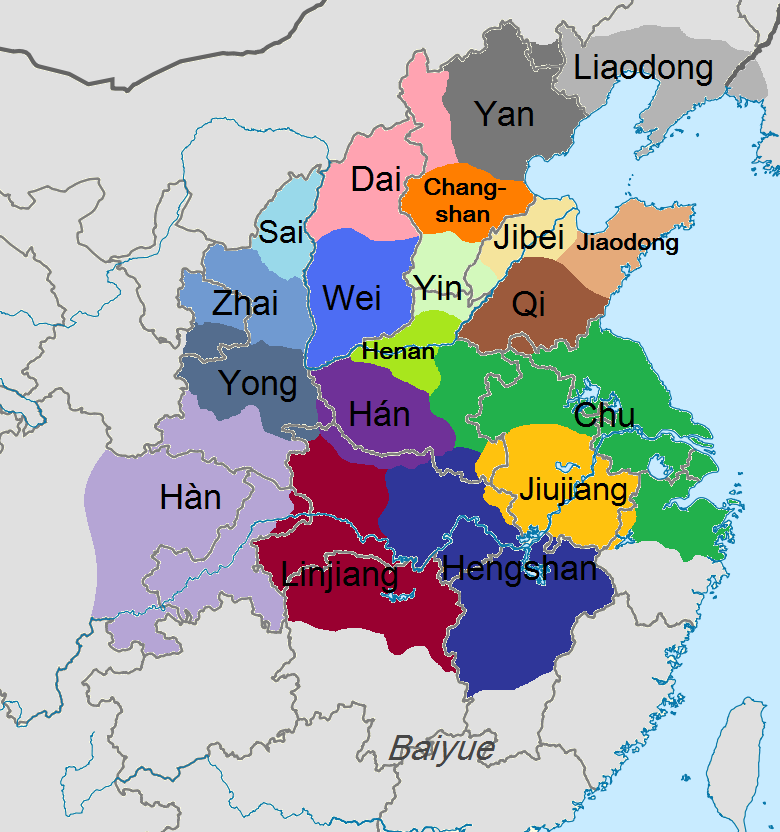|
Wu Rui (King Of Changsha)
Wu Rui (died ), King Wen of Changsha, was an ancient Chinese general who helped Liu Bang establish the Han dynasty. A Baiyue magistrate of Po County under the Qin dynasty, he rose to become King of Hengshan during the collapse of Qin and was enfeoffed as King of Changsha during the early Han dynasty. Life An ethnic Yue, Wu Rui was the son of Wu Shen ''Wú Shēn''), formerly grand marshal ''dà sīmǎ'', the highest military office) of the Chu state. During the Qin dynasty, Wu Rui was the magistrate of Po County, which had not yet flooded. He enjoyed high popularity among the local Baiyue people and was known as "Lord of the Po" After Chen Sheng launched the Dazexiang Uprising against the Qin, Wu Rui organized a Baiyue army and joined the rebellion. Wu Rui's followers included Mei Xuan ''Méi Xuān'') and his son-in-law Ying Bu, both of whom assisted Liu Bang and played a major role in his victory against Qin and Xiang Yu. In Wu Rui was bestowed the title King of Heng ... [...More Info...] [...Related Items...] OR: [Wikipedia] [Google] [Baidu] |
Wu (surname)
''Wú'' is the pinyin transliteration of the Chinese surname wikt:吳, 吳 (Simplified Chinese wikt:吴, 吴), which is a common surname (family name) in Mainland China. Wú (吳) is the sixth name listed in the Song Dynasty Chinese classics, classic ''Hundred Family Surnames''. In 2019 Wu was the ninth most common surname in Mainland China. A 2013 study found that it was the eighth most common surname, shared by 26,800,000 people or 2.000% of the population, with the province having the most being Guangdong. The Cantonese and Hakka language, Hakka transliteration of 吳 is Ng (surname), Ng, a syllable made entirely of a nasal consonant while the Min Nan transliteration of 吳 is Ngo, Ngoh, Ngov, Goh, Go, Gouw, depending on the regional variations in Min Nan pronunciation. Shanghainese transliteration of 吳 is Woo. 吳 is also one of the most common surnames in Korea. It is spelled O (surname), 오 in Hangul and romanized O by the three major romanization systems, but more commo ... [...More Info...] [...Related Items...] OR: [Wikipedia] [Google] [Baidu] |
Eighteen Kingdoms
The historiographical term "Eighteen Kingdoms" ( zh, t=十八國), also translated to as "Eighteen States", refers to the eighteen ''fengjian'' states in China created by military leader Xiang Yu in 206 BCE, after the collapse of the Qin dynasty.林达礼,中华五千年大事记, 台南大孚书局, 1982, p. 56 The establishment and abolishment of the Eighteen Kingdoms marked the beginning and end of a turbulent interregnum known as the Chu-Han Contention. The details of the feudal division are as follows: The Eighteen Kingdoms were short-lived: almost immediately rebellion broke out in Qi, after which Tian Rong conquered Jiaodong and Jibei, reuniting the old Qi state. Meanwhile, Xiang Yu had Emperor Yi of Chu and King Han Cheng of Hán killed. Thereafter, Liu Bang of Hàn conquered the lands of the Three Qins, thereby formally starting the Chu–Han Contention. Following many battles and changing alliances, Hàn defeated Chu and subdued all other kingdoms, where Liu Bang a ... [...More Info...] [...Related Items...] OR: [Wikipedia] [Google] [Baidu] |
